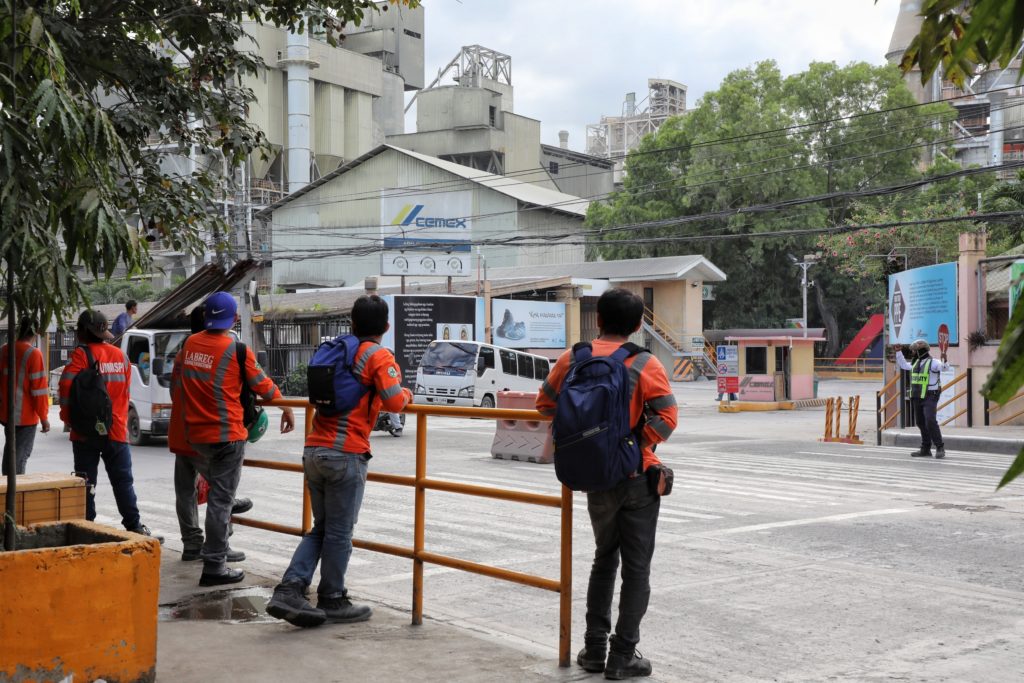The downsized employees of Apo Cement Corporation are facing yet another grim news: a compressed workweek starting in December.
The management of Apo Cement announced in a general assembly with their employees on Wednesday morning that starting Christmas week, they will only be reporting for three to four days a week.
Johnrell Goles, president of Apo Cement Workers’ Union, said the new scheme will cripple the employees financially since their semi-monthly income will likely be reduced by an equivalent of two to four days pay.
“Pag-announced nila nga compressed working days, wala na mi pangutana. Na-immune na tingali mi pagpirmiro nga announcement sa layoff ug kahibaw na mi unsay rason nga nagbawas og schedule,” Goles told Cebu Daily News.
(When they announced the compressed workweek scheme, we did not ask anymore questions. It seems that we became immune after the last announcement on the layoff and we already know the reason.)
Just last week, Apo Cement implemented the temporary layoff of up to 30 percent of their regular employees and up to 40 percent of their contractual workers.
Apo Cement, through spokesperson Chito Maniago, said in a statement Wednesday that they had to implement a compressed workweek due to the current financial challenges faced by the company as the quarry operation of its sister company and primary raw material supplier, Apo Land and Quarry Corp. (ALQC), remains suspended.
“It is regrettable that these difficult decisions had to be made, but APO Cement needs to take remedial measures to reduce the adverse impact of the current situation in this period of uncertainty brought about by the disruption in APO Cement’s source of raw materials and to pursue the best interest of the organization’s various stakeholders,” the statement read.
The operations of ALQC have been suspended for over two months now, or since the massive landslide that claimed over 70 lives in Sitio Sindulan, Barangay Tinaan, took place on Sept. 20.
The operations of ALQC remain suspended pending the approval and implementation of the hazard reduction plan on ground zero of the landslide to ensure that any human activity near the area would be safe.
Mayor Kristine Vanessa Chiong, speaking during the rally staged by Apo Cement employees on Nov. 14, explained that the hazard reduction plan was forwarded to the central office of the Department of Environment and Natural Resources. However, she was told recently that it would be the National Disaster Risk Reduction and Management Council (NDRRMC) that would approve the plan.
Apart from the reducing its employees’ working days, Apo Cement also closed its terminal in Davao City and suspended operation in one of their two kilns in Cebu. The kiln produces clinker, the main component for cement.
The Davao City terminal is one of the two distribution centers of the company in Mindanao and is vital in supplying the needs of infrastructure projects in the region.
Apo said they hoped for the government to come up with a decisive, reasonable and fair action in addressing the issue on their quarry’s suspension.
“We will continue to cooperate with government authorities to find a solution. More importantly, we remain committed to the City of Naga and our host communities in supporting efforts to restore normalcy, after such immense natural disaster,” the statement read.
Price increase
Apo Cement, at the same time, also announced a price increase of P20 for their cement products in order to partially recover from their increase production costs.
But competition and the presence of other suppliers are expected to temper the effects of the price increase to be implemented by Apo Cement Corp. on their cement products.
Property developers, for example, can tap other sources if one brand of cement decides to increase their prices, said Cebu Landmasters Inc. president and CEO Jose Soberano III.
“Developers have their own way of sourcing products based on prices that will be acceptable to them. There is not much impact (on Apo’s price increase). These increases are not really that much and prices of cement have been pretty steady for a number of years,” he told CDN.
Aside from other Cebu-based cement manufacturing companies, Soberano said there are international brands that are trying to penetrate the Philippine market, noting that cement brands from countries like Vietnam and other Southeast Asian countries have started coming in.
These foreign brands also offer competitive prices.
Soberano said that while they understand the business strategy being implemented by Apo Cement, developers and other consumers of cement products can always opt to go with other suppliers that offer cheaper prices.
“Developers have sources both local and foreign. It has to be that way. You have to be open to alternative suppliers. We need that because we want to make sure that we get the most competitive prices also for our buyers in the future,” Soberano said.
The Department of Trade and Industry in Central Visayas (DTI-7) also sees very minimal impact on the industry the decision of Apo Cement to increase the price of its products.
DTI-7 Regional Director Asteria Caberte pointed out that the increase in Apo Cement’s product cost was minimal, as it could not afford to price itself too high “because there is so much competition.” /WITH REPORTER JOSE SANTINO BUNACHITA
